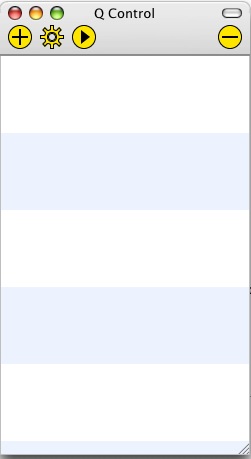Emulating the XO/Quick Start/Mac: Difference between revisions
(→Installing QEMU for MacOS-X: Latest Stable version) |
(QEMU Arguments) |
||
| Line 21: | Line 21: | ||
'''[[Media:Q advanced prefs.jpg|Advanced Prefs]] | QEMU Arguments:''' -redir tcp:2222::22 |
'''[[Media:Q advanced prefs.jpg|Advanced Prefs]] | QEMU Arguments:''' -redir tcp:2222::22 |
||
-- click '''(Create PC)''' -- |
-- click '''(Create PC)''' -- |
||
For all QEMU Arguments, see [[Emulating_the_XO/Quick_Start]]. At the time of writing, it e.g. mentions -net user -net nic,model=rtl8139 as well - are those not needed on a Mac?? Anyhow, they can change/evolve, so please check the Quick Start page for the latest recommended arguments! |
|||
<br clear="all"> |
<br clear="all"> |
||
Revision as of 08:47, 7 October 2007
Installing QEMU for MacOS-X
You should already have an XO build image.
The port of Qemu for MacOSX is called Q and can be found in kju-app.org. Download and install Q.app stable version 0.9.0a89. Other builds are here: kberg.ch/q/builds/
Setting up
Click on the (+) button to create a new guest:
Create new Guest: Name: OLPC Operating System: Q Standard Guest -- click (Create PC) --
Proceed to configure its preferences:
General Prefs | SMB Filessharing: No file sharing Hardware Prefs | Hard disk: Select your unzipped build image Advanced Prefs | QEMU Arguments: -redir tcp:2222::22 -- click (Create PC) --
For all QEMU Arguments, see Emulating_the_XO/Quick_Start. At the time of writing, it e.g. mentions -net user -net nic,model=rtl8139 as well - are those not needed on a Mac?? Anyhow, they can change/evolve, so please check the Quick Start page for the latest recommended arguments!
Starting OLPC Environment
Double click on the newly created "OLPC" to launch a window for it.
- NOTE
- what follows may not be required. If you happen to do with or without it, please let us know in the discussion page (signing it) so this section can be updated accordingly.
— press "space" to get into GRUB
— choose "OLPC for Qemu Target",
— press "e" to edit commands,
— select "kernel" line, and press "e"
— add "single" option at the end of the line
— hit "return", then "b" to boot
Advanced
You may encounter some issues supporting USB devices.
You can run Q.app from the command line:
- $ /Applications/Q.app/Contents/MacOS/i386-softmmu.app/Contents/MacOS/i386-softmmu -hda olpc/olpc-redhat-stream-development-devel_ext3.img -serial stdio




